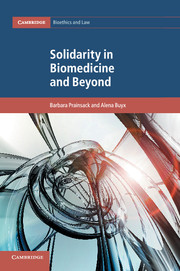Afterword
Published online by Cambridge University Press: 09 February 2017
Summary
Reading this book reminded me very powerfully of the experience of writing my own Cambridge University Press monograph, Genetic Privacy, which was set against the myriad contributions from a wealth of disciplines on the very notion of privacy itself. The particular phrase that sprung to mind (unattributed and misquoted) was: ‘Privacy, like an elephant, is more easily recognised than described.’ Barbara Prainsack and Alena Buyx have demonstrated admirably that much the same can be said about solidarity, although we owe them a considerable debt not only for leading us skilfully through the relevant literatures, but also for offering a very rich and workable definition of solidarity that takes us well beyond the merely descriptive aspects of the concept. They have consummately delivered on their overarching objective ‘… to improve the analytical value of solidarity’. Indeed, I believe that there are numerous ways in which they have achieved this even beyond their own account of their contribution.
Beyond Description
The essentially human experiences that are captured by appeals to concepts such as solidarity (and privacy) can lead us all too quickly to imagine, and assume, that we can only provide accounts in descriptive, experiential terms. While establishing their contribution determinedly in the prosocial sphere, Prainsack and Buyx have argued convincingly that we can, and must, transcend these purely descriptive accounts of solidarity as something that simply ‘is’ or ‘is not’. It is trite that empirical studies can offer evidence of the sentiment-based aspects of solidarity, but this is not the basis of the claims in this work. The authors reject a definition that is solely about a ‘value’, an ‘obligation’ or a ‘feeling’, while embracing both the descriptive and prescriptive potential of solidarity. They are able to do so by not losing sight of the essentially human experiential aspect of solidarity by grounding their contribution in enacted practices. Thus, something must be ‘done’ by humans, not merely prescribed or felt. In this sense, I would suggest that we can further assist Prainsack and Buyx in their analysis by contrasting solidarity with the anthropological notion of communitas. The Scots-born anthropologist, Victor Turner, is renowned as the modern father of accounts of liminality, that is, moments in space and time when individuals are in transition from one status or phase of life to another, and often liminality is experienced collectively.
- Type
- Chapter
- Information
- Solidarity in Biomedicine and Beyond , pp. 187 - 192Publisher: Cambridge University PressPrint publication year: 2017

